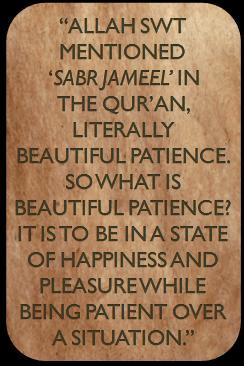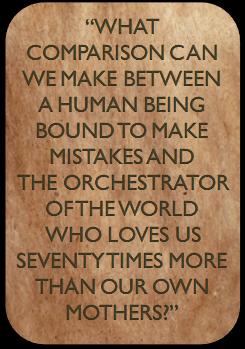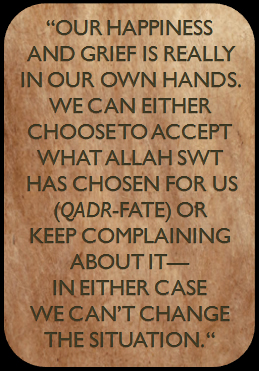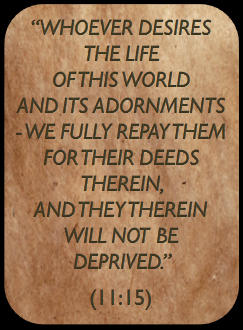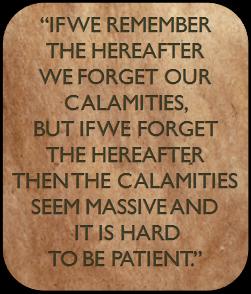|
||||||||||||||||||||||||||||||||

|
||||||||||||||||||||||||||||||||
 |
||||||||||||||||||||||||||||||||
|
|
||||||||||||||||||||||||||||||||
|
|
Beautiful Patience
Just like everything else in life, beauty also has a materialistic as well as a spiritual dimension. Tangible things like trees, flowers, animals, even manmade objects such as cars or furniture can be termed beautiful and we will categorize them under materialistic beauty. Spiritual beauty is the hidden beauty behind the obvious such as the soul of the person or the qualities one carries. Patience is also one such quality that has a beauty of its own and it beautifies anyone who carries this quality. Allah SWT mentioned ‘sabr jameel’ in the Qur’an, literally beautiful patience. So what is beautiful patience? It is to be in a state of happiness and pleasure while being patient over a situation. The question that arises here is how can a person be in a state of bliss and complete contentment while suffering from an infliction? Allah SWT says in Surah Ma’arij:  So be patient with gracious patience. Indeed, they see it [as] distant, But We see it [as] near. (70: 5—7)
In order to understand this verse we need to comprehend the three elements that are mentioned here:
Allah SWT has elevated patience to something that is beautiful, thus bringing us away from the materialistic view of things and letting us look beyond into the spiritual realm. He SWT is telling us:  But perhaps you hate a thing and it is good for you; and perhaps you love a thing and it is bad for you. And Allah Knows, while you know not. (2:216)
All of this is meaningless unless we have real Iman in Allah SWT as our Rabb—the one who knows what is good for us, and the Day of Judgment. That is why patience is called half of Iman.  So be patient. Indeed, the promise of Allah is truth. And let them not disquiet you who are not certain [in faith]. (30:60)
We have the examples of Bilal (RA), Sumayya (RA), Khubaib (RA) and other companions who displayed not only supernatural endurance to immense sufferings but joy while inflicted with torture. How could it be that they were happy while others around them were crying over their pain? We can only understand it if we have experienced even a moment of reality of Iman where everything in this life becomes meaningless and the only thing that matters is making Allah SWT happy. These people had reached a level where they were already living in the hereafter and they weighed every situation according to its significance in the afterlife. In this state when a calamity strikes, the person thinks not of the calamity but the One who allowed this calamity to happen and the reward that is waiting. Prophet Muhammad SAW promised: “No tiredness, exhaustion, worry, grief, distress or harm befalls a believer in this world, not even a thorn that pricks him, but Allah expiates some of his sins thereby.” [Bukhari & Muslim]
What comparison can we make between a human being bound to make mistakes and the orchestrator of the world who loves us seventy times more than our own mothers? He doesn’t want to hurt us, only elevate us spiritually by cutting our hearts’ ties with this world. This trust and love is what gives the patience its real beauty; and this mystical beauty is confounding to anyone but another believer. Allah SWT is the one who has created us with emotions and feelings, and He knows that it is not easy to be patient over the loss of a loved one or a dear object. This is why He SWT has promised immense rewards for patiently enduring the loss of a loved one and re-unification with them in the hereafter. Not only that, one can reach such high levels as being a wali or friend of Allah based on his Iman and patience, that he can intercede on behalf of his loved ones who might be sentenced for punishment in hellfire. Allah SWT also says in the Qur’an:  Allah does not charge a soul except [with that within] its capacity. (2: 286)
Keeping this assurance of Allah SWT in mind, one finds the courage to face any difficulty and tribulation. This was the practice of the Prophets and all those who followed the truth. We have the story of Yaqub (AS) who saw his own sons inflicting injustice on their brother Yusuf who was chosen to be a prophet, yet instead of avenging his son he chose to be patient.  [Jacob] said, "Rather, your souls have enticed you to something, so patience is most fitting. Perhaps Allah will bring them to me all together. Indeed it is He who is the Knowing, the Wise." (12:83)
True beautiful patience is reflected in a person’s voice and face. A believer has a content, happy face even when suffering, and his voice does not betray the sad emotions he is dealing with. We will meet Allah SWT in the same state that we died in and none of us know the time of death. If we die complaining and lamenting over our situation, what face will we stand in front of Allah SWT with? How will we justify our complaints over our misfortune while simultaneously being drowned in immense gifts of Allah SWT? Our happiness and grief is really in our own hands. We can either choose to accept what Allah SWT has chosen for us (Qadr-fate) or keep complaining about it—in either case we can’t change the situation. This acceptance of fate is what brings joy and beauty to the face and keeps a person young and healthy; whereas, it is complaints and resistance to fate which brings misery, ugliness, and old age upon us. In other words, remembrance of hereafter keeps us young and beautiful and dunya makes us old. The choice is fairly simple and it is in your own hands: surrender to the will of Allah and be happy in this life and the hereafter; or be miserable without being able to change what has been ordained for you. It is the bearers of beautiful patience that are held in esteem and are promised victory by Allah SWT.  O you who have believed, seek help through patience and prayer. Indeed, Allah is with the patient. (2:153)
 O you who have believed, persevere and endure and remain stationed and fear Allah that you may be successful. (3:200)  And obey Allah and His Messenger, and do not dispute and [thus] lose courage and [then] your strength would depart; and be patient. Indeed, Allah is with the patient. (8:46)  Except for those who are patient and do righteous deeds; those will have forgiveness and great reward. (11:11)  Whoever desires the life of this world and its adornments - We fully repay them for their deeds therein, and they therein will not be deprived. (11:15)  So be patient, [O Muhammad], as were those of determination among the messengers… (46:35)  Whatever you have will end, but what Allah has is lasting. And We will surely give those who were patient their reward according to the best of what they used to do. (16:96)
 "Indeed, I have rewarded them this Day for their patient endurance - that they are the attainers [of success]."(23:111)  And not equal are the good deed and the bad. Repel [evil] by that [deed] which is better; and thereupon the one whom between you and him is enmity [will become] as though he was a devoted friend. But none is granted it except those who are patient, and none is granted it except one having a great portion [of good]. (41: 34-35) Here Allah SWT has equated patience and self restraint with the greatest good fortune.  Those will be given their reward twice for what they patiently endured and [because] they avert evil through good, and from what We have provided them they spend. (28:54)  So be patient, [O Muhammad]. Indeed, the promise of Allah is truth. And ask forgiveness for your sin and exalt [ Allah ] with praise of your Lord in the evening and the morning. (40:55)
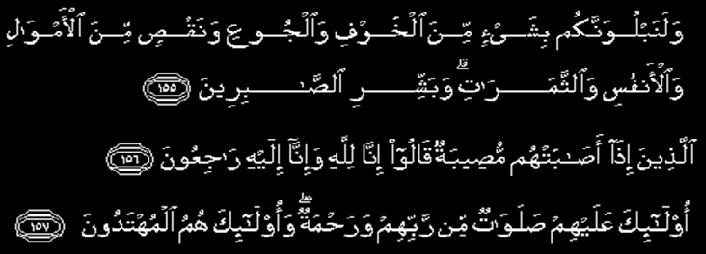 And We will surely test you with something of fear and hunger and a loss of wealth and lives and fruits, but give good tidings to the patient, Who, when disaster strikes them, say, "Indeed we belong to Allah , and indeed to Him we will return." (2:155-157) Patience is related to calamities since we exercise patience over things that are hard on us; whereas, Jamaal or beauty is related to things that we like. The glue that joins the two is iman or faith in the afterlife. Once a person reaches the level where hereafter overshadows the desires and comforts of this world, he is enabled to exercise beautiful patience. When a person is in a state of vigilance and his faith is alive in his heart, he understands Who has ordained the situation for him, and that this situation is ordained for a purpose. This allows the person to look at his condition not as a calamity but as a reward because “Allah SWT never takes except to give.” This giving is in the form of qualities such as contentment, happiness, tranquility, ability to forgive etc.
The key ingredient here is Iman and Thiqa—it is Iman and trust in Allah that allows one to remember the bounties of Allah and to remain focused on Who is allowing the situation to happen and why, and to forget the actual calamity. This grants the person the ability to display beautiful patience which Allah SWT has called the greatest good fortune:  But none is granted it except those who are patient, and none is granted it except one having a great portion [of good]. (41: 35) Bilal RA, the moadhin (the one who calls to prayer) of RasulAllah SAW left a legacy of patience and endurance for all believers. He was inquired by the Prophet SAW about how he was able to smile while others around him cried over his suffering and torture; he said: every time I put the torture the unbelievers inflicted on me on one side of the scale and put the bounty of guidance on the other, I forgot my pain. By this way, if the eyes are on the prize the suffering of this life becomes meaningless. Ayub AS’s patience is renowned in all spiritual traditions. He endured immense suffering and loss for approximately eighteen years and when his wife encouraged him to ask Allah SWT to alleviate his suffering, he refused saying he is shy to ask Allah SWT for short term relief after enjoying His immense bounties for many years of his life and that he would rather be patient.  So be patient with gracious patience. Indeed, they see it [as] distant, But We see it [as] near. (70:5—7)
If we have Iman in the hereafter and trust in Allah SWT Who is the orchestrator of our lives, then we will be able to demonstrate the beautiful patience that Allah SWT expects from believers; but if we lose the faith and trust, we will lose the patience as well. This needs to apply not only in our relationship with Allah but our day to day ventures as well. When we think with our minds instead of trusting the one who ordained the situations, the All-Wise and Just Allah SWT, we become weak and lose control of ourselves; but if we trust in Allah SWT then He will grant us the ability to handle whatever He SWT sends our way. “Wondrous are the believer’s affairs. For him there is good in all his affairs, and this is so only for the believer. When something pleasing happens to him, he is grateful, and that is good for him; and when something displeasing happens to him, he is patient, and that is good for him.” (Prophet Muhammad; Muslim)
 If You Liked This Article, Please Download it, Print it, and Share it: Just 'Right-Click' on the button of your choice and choose 'save target as'
|
|||||||||||||||||||||||||||||||


